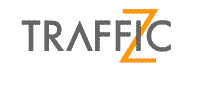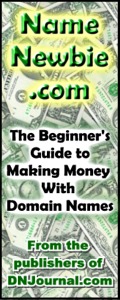|
Thanks
to DomainSponsor keeping everyone up late, there was plenty of
elbow room at breakfast Thursday morning, but by the time the
first seminar on click fraud began at 10am attendees were
back out in force. This two-hour session featured attorney John
Berryhill,
Dan Warner and the head of Google’s Domain Channel, Eytan
Elbaz. Elbaz said that Google has a much better handle on
eliminating click fraud than mainstream print outlets
let on. You have to remember that print media is losing readers
and advertisers to the Internet in droves, so they have a vested
interest in trying to scare advertisers away from the new medium.
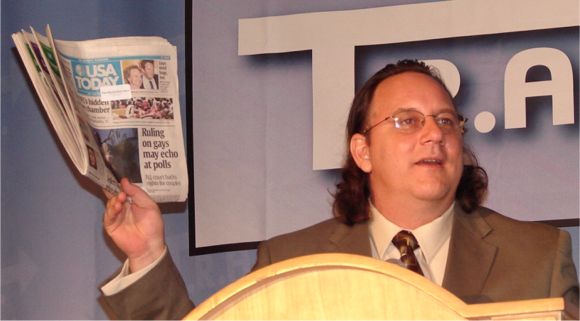
John
Berryhill - How come no one talks about dumpster fraud
(newspaper ads that go straight into the trash)?
Berryhill
made a point of showing how much paid advertising in print media
is wasted, probably much more than is wasted online. For example,
he held up a copy of USA Today which is distributed at
most hotels free of charge. This is counted as “circulation” -
sets of eyeballs reading the ads, even though a huge
percentage of the distributed papers are thrown away and never
read, yet advertisers pay as if their ads had been seen by the
number of people cited in the circulation figures.
|
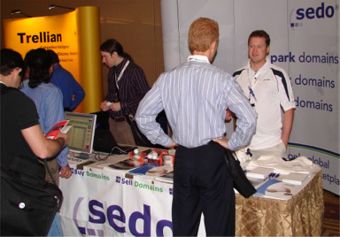
Exhibit
area |
Warner
said that the click fraud problem was much more one of
perception than reality. He estimated that the percentage
of ad spending lost to successful click fraud is less than
1%.
Thursday’s
luncheon was sponsored by Directi. The lunch break
also gave attendees a good opportunity to explore the
exhibit area which featured a record number of companies
at this show. Domain owners could meet face to face with
representatives from many well-known companies and get
personal demonstrations of the services they offer. Many
also gave out promotional items ranging from T-Shirts and
beach shoes to umbrellas and tote bags. |
The
afternoon session opened with a 1:30 seminar on valuing individual
domain names and tips on selling to end users. Warner and Rohan
returned for that panel where they were joined by Afternic.com
President Roger Collins, Sedo’s Chief Strategy
Officer Matt Bentley and Robert Hoult, Executive VP
at the Intersearch Group. Bentley and Hoult explained what
factors end users look at in valuing a domain. If sellers look at
it from their perspective and can make a persuasive case for how
the domain can provide them with a real return on investment they
can greatly increase their chances of making the sale.

Left
to right: Jordan Rohan (RBC Capital Markets),
Robert Hoult (Intersearch Group) and Matt Bentley
(Sedo.com)
I
was on the panel for the next session that posed an interesting
question, “If you had $100,000 to invest in domains, would you
be better off buying a single premium .com domain or spreading the
money out over 100 domains at $1,000 each in non .com extensions?”.
Joining me in tackling that topic were iREIT CEO Bob Martin,
Sedo CEO and Co-founder Tim Schumacher,
NameMedia VP Brian Taff (one of the original
co-founders of BuyDomains) and noted attorney Ari
Goldberger.
|
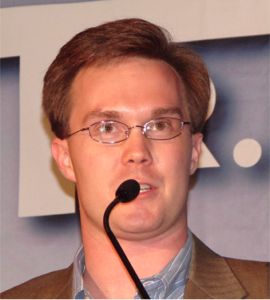
iREIT
CEO Bob Martin |
Martin,
Taff and Goldberger all like the tried and true .com
approach, with Goldberger comparing having a great .com
domain to owning a Picasso. Schumacher and I leaned
toward more diversification. I believe the answer to the
question depends in large part on what you intend to do
with domains. If you plan to build a full time business on
one and sell goods or services, I would take a great .com
too. If you were buying for a PPC revenue stream, the .com
will usually be the right choice as well. But if you are
spending $100,000 with the intention of having inventory
for a business devoted to buying and selling domains, I
like having more than one egg in the basket, especially
when we know that domains are currently an illiquid
investment. Dan Warner estimates that only 1-2% of
a typical portfolio is sold in a given year. |
Having
a wide variety of carefully chosen non .coms (primarily .us and
.info in my case) has been profitable for me for some time
now and becomes more so each month as these extensions slowly but
steadily gain recognition, especially in the small business sector
that has been priced out of the market for quality generic .coms.
|
It’s
not surprising that Schumacher also likes the idea of
spreading the money among multiple domains because Sedo
has proven it works while building a dominant position in country code sales with major ccTLD extensions
like
.de, .co.uk, .eu and .us.
Schumacher showed an interesting slide that used stock
terminology, Buy, Hold or Sell, to
express his outlook for various extensions. His Buy
column included .us and other major ccTLDs, .info,
.mobi and IDN’s (International Domain
Names). His Hold column listed .eu, .com
and .net and his Sell column contained .biz,
.cc, .ws and .tv.
This
topic provides fodder for a debate that could go on for
months, but I think the bottom line is that you can
succeed with either approach if you are careful in your
selection of names. It’s hard to go wrong with highly
searched keywords and good 3-letter combinations in major
extensions for example. As millions of businesses pour
online, .com continues to strengthen as the gold standard,
but the overall pie is getting bigger, creating a steadily
increasing market for some of the better non .com
extensions as well. |

Tim
Schumacher
CEO & Co-Founder
Sedo.com |
The
final session Thursday was one that T.R.A.F.F.I.C. co-founder Rick
Schwartz called the “best seminar in the history of
T.R.A.F.F.I.C.!” It featured a Madison Avenue panel of ad
agency and marketing executives who tried to explain why major
corporations had failed to snap up the generic keyword domains
that define their industries. The corporations are the entities that
have the deep pockets needed to pony up the kind of money many
owners of premium domains think their assets are worth. Bringing
the two sides together could change the face of the industry and
Schwartz believes this session was the first step in getting that
done.

Madison
Avenue panel - Left to Right: Bill Lickson,
Laura Sturtz, Lance Podell and Will Marigiloff
The
panel included Bill Lickson, Director of Interactive for
the Zimmerman Agency (one of the 20 largest ad agencies in
the U.S.), Laura Sturtz from PR and marketing firm Euro
RSCH Magnet, Seevast (formerly Kanoodle) CEO Lance
Podell and Will Margiloff, CEO of Innovation
Interactive.
All four indicated that domains represented a new opportunity that
the corporate giants have not yet recognized. They pointed out that
corporate cultures move very slowly and that it could take a
couple of more years before they start figuring it out.
|

Schwartz
frustrated by Madison Ave. |
They
suggested domain owners need to do everything they can to
educate corporate leaders, including taking advertisements
in trade journals they will see in their world. The
fireworks didn’t really begin until after the panelists
opened up the session to questions from the floor. As is
often the case, Schwartz was the guy who lit the match.
Using hotels as just one example, Schwartz asked the
panel “How is it that Hilton and Marriott
and Westin and all of the rest couldn’t figure
out how many leads they would get from a domain like hotels.com?
Instead of paying a million or two for a domain they now
have to pay tens of millions (for leads) for the
rest of their lives. So they flunked – they
failed – and their advertising agencies failed them too!”
This
drew a round of applause and, as you might imagine, set
off a spirited debate. The panel explained that
corporations have been trained to think in terms of “brands”
for 200 years now. They view their brand as something with
qualities that set it apart from generics, in fact they
view brands as the exact opposite of a generic
term. |
What
we think they fail to understand is that a generic domain name
reaches the consumer when they are thinking about buying something
in a category, like an automobile, before they zero in on brands.
Owning the generic domains, like cars.com, could effectively make
them the gatekeeper for the entire industry, allowing them to
intercept the customer and send them to the brand they want
before they go to a competitor.
Schwartz
is planning to bring the two sides together again at the next show
in Las Vegas and Madison Avenue will be a centerpiece of the first
New York show next June. In the end, the payoff could be greater
than any other single effort domain owners could make.
SmartName.com
sponsored the Thursday dinner and partners Ari Goldberger
and Larry Fischer brought an entirely new twist to the
usual evening meal by running a game show featuring 5 contestants
chosen from the audience.
| They
presented a list of domain names, such as MadonnasBaby.com,
iREITDomains.com and CheapVasectomy.com and the
contestants had to guess if the domains were registered or
not registered.
The
first two names were unregistered and stumped the
contestants who thought they would have been taken (of
course someone did take them as soon as they got back to
their hotel room!). To add to the fun SmartName put up a $2,000
first prize that was won by Name Intelligence
CEO Jay Westerdal. It went over so well that
Fischer said that he would start running similar contests
online next week at DirectNavigation.com. |
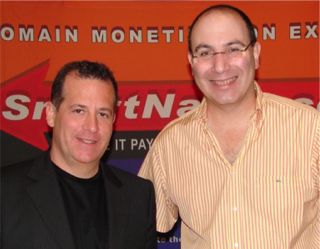
Ari
Goldberger (left) and Larry Fischer
SmartName.com |
After
dinner, many attendees had to choose between two great parties. iREIT.com
loaded their guests on buses and took them out for a night at the Hard
Rock Casino. At the same time, TraffficZ.com took a
group on a cruise on the Intracoastal Waterway. They chartered the
100-foot double decked Miami Magic yacht for that
event. I went along for the ride and wound up meeting brothers Michael
and David Castello for the first time. They own a
remarkable portfolio of one-word and geo domains including gems
like PalmSprings.com and 117 other city names.
|
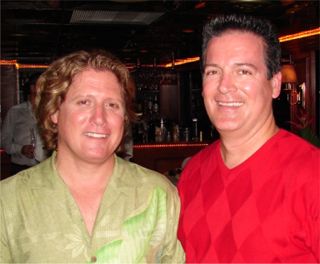
Michael
Castello (left) and David Castello
Castello Cities Internet Network, Inc. |
The
personable siblings also have a fascinating life story as
a pair of musicians struggling to make ends meet who
struck it rich in the world of domains. I found talking
with them so engrossing I decided they had to be the
subject of our next cover story and that is coming in
December.
The
Castellos are a perfect example of a “problem” I run
into at every T.R.A.F.F.I.C. conference, especially now
that the shows have gotten bigger. There are always a lot
of people you want to talk to but you inevitably run into
someone with such a great story that you stop and go no
further for the next hour or two! In the blink of an eye the
week is over before you’ve made all of the contacts you
wanted to make, but it’s a great problem to have because
these special encounters frequently lead to great things. |
Continue
to Page 3
-
Get
Up Close and Person with T.R.A.F.F.I.C. Speed Networking
-
The
Record Breaking Moniker LIVE Domain Auction
-
See
Who Won the 2006 T.R.A.F.F.I.C. Awards
-
The
T.R.A.F.F.I.C. East Photo Gallery
|


